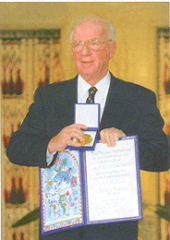 |
 |
 |
 |
| “Our
peoples have chosen us to give them life.”
- Yitzhak Rabin |
| |
 |
Rabin
wins Nobel Peace Prize |
WINNING
THE PEACE PRIZE - In 1964, Yitzhak
Rabin was a grizzled soldier doing
his best to help Israel through decades
of turmoil. Thirty years later, in
1994, he would share the most renowned
award in the world with two men whose
life paths had crossed his in ways
that were unpredictable to say the
least. Rabin would receive only one-third
of the 1994 Nobel Peace Prize. The
remainder would go to men who were
former rivals or enemies to Rabin,
but had come around in a venture for
peace that had little to lose but
everything to gain.
On December 9, 1994, the Peace Prize
was awarded to Yitzhak Rabin, Shimon
Peres, and Yasser Arafat for their
roles in paving the way for the Declaration
of Principles. Ironically enough,
the ceremony took place in Oslo. Rabin
was stunned and somewhat flattered
by his achievement, but the opportunity
to further the nascent peace was something
he could not pass up. In his acceptance
speech, he gave an address of unrestrained
passion and honesty. Speaking candidly
from the heart, the accumulated wisdom
and experience of seventy years was
powerfully evident.
At
an age when most youngsters are
struggling to unravel the secrets
of mathematics and the mysteries
of the Bible; at an age when first
love blooms; at the tender age of
sixteen, I was handed a rifle so
that I could defend myself - and
also, unfortunately, so that I could
kill in an hour of danger.
That was not my dream. I wanted
to be a water engineer. I studied
in an agricultural school and I
thought that being a water engineer
was an important profession in the
parched Middle East. I still think
so today. However, I was compelled
to resort to the gun.
I served in the military for decades.
Under my command, young men and
women who wanted to live, wanted
to love, went to their deaths instead.
Under my command, they killed the
enemy's men who had been sent out
to kill us.
Ladies and Gentlemen, in my current
position, I have ample opportunity
to fly over the State of Israel,
and lately over other parts of the
Middle East, as well. The view from
the plane is breathtaking: deep-blue
lakes, dark-green fields, dun-colored
deserts, stone-gray mountains, and
the entire countryside peppered
with whitewashed, red-roofed houses.
And cemeteries. Graves as far as
the eye can see. Hundreds of cemeteries
in our part of the Middle East -
in our home in Israel - but also
in Egypt, in Syria, Jordan, Lebanon,
and Iraq. From the plane's window,
from thousands of feet above them,
the countless tombstones are silent.
But the sound of their outcry has
carried from the Middle East throughout
the world for decades. <click
here for entire speech>
|
| |
| |

 |
|
 |
 |
